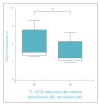Diagnosis of symptomatic uncomplicated diverticular disease and the role of Rifaximin in management
- PMID: 28467330
- PMCID: PMC6166204
- DOI: 10.23750/abm.v88i1.6360
Diagnosis of symptomatic uncomplicated diverticular disease and the role of Rifaximin in management
Abstract
Patients with diverticulosis who develop persistent abdominal pain, bloating and changes in bowel habits not associated with overt inflammation may have symptomatic uncomplicated diverticular disease (SUDD). The severity and frequency of SUDD symptoms may have an impact on daily activities and severely affect quality of life. Effective management of SUDD should follow a three part strategy: divert, tackle and maintain. Divert to make the correct diagnosis: several symptoms of SUDD are common to other conditions that require different therapeutic approaches. However, several key differences should be used to diagnose SUDD. Pain in SUDD is normally in the iliac fossa, persistent, often lasting more than 24 hrs, and is not relieved by bowel movement, as is often the case with irritable bowel syndrome. Another difference is in the timing: the prevalence of SUDD increases with age, and patients under the age of 40 years are less likely to have diverticula. It is useful to establish whether a patient has diverticulosis, especially if the patient is relatively young; lack of diverticula excludes SUDD. Cross-sectional imaging is indicated; however, recent archival image data or ultrasonography may be useful alternatives. Laboratory tests should be ordered to exclude overt inflammation. Once the diagnosis of SUDD is made, the patient should receive effective therapy to tackle the condition. This should include dietary fibre supplementation and cyclic treatment with rifaximin 400 mg twice daily for 7 days per month. Once symptom control is achieved, it should be maintained by continuing therapy for at least 12 months.
Keywords: symptomatic uncomplicated diverticular disease (SUDD), rifaximin, management of SUDD.
Figures




References
-
- Locke GR 3rd, Zinsmeister AR, Fett SL, Melton LJ 3rd, Talley NJ. Overlap of gastrointestinal symptom complexes in a US community. Neurogastroenterol Motil. 2005;17:29–34. - PubMed
-
- Penner RM, Fishman MB, Sumit R, Majumdar SR. Causes of abdominal pain in adults. Available at: http://www.upto-date.com/contents/causes-of-abdominal-pain-in-adults .
-
- Kovacic K. Current concepts in functional gastrointestinal disorders. Curr Opin Pediatr. 2015;27:619–24. - PubMed
